How To Take Care Of Petunias (Petunia Flower Care Guide)
Petunias are annual flowers that need full sun, well-drained soil, regular watering, deadheading, and fertilization every 2-3 weeks for optimal growth.
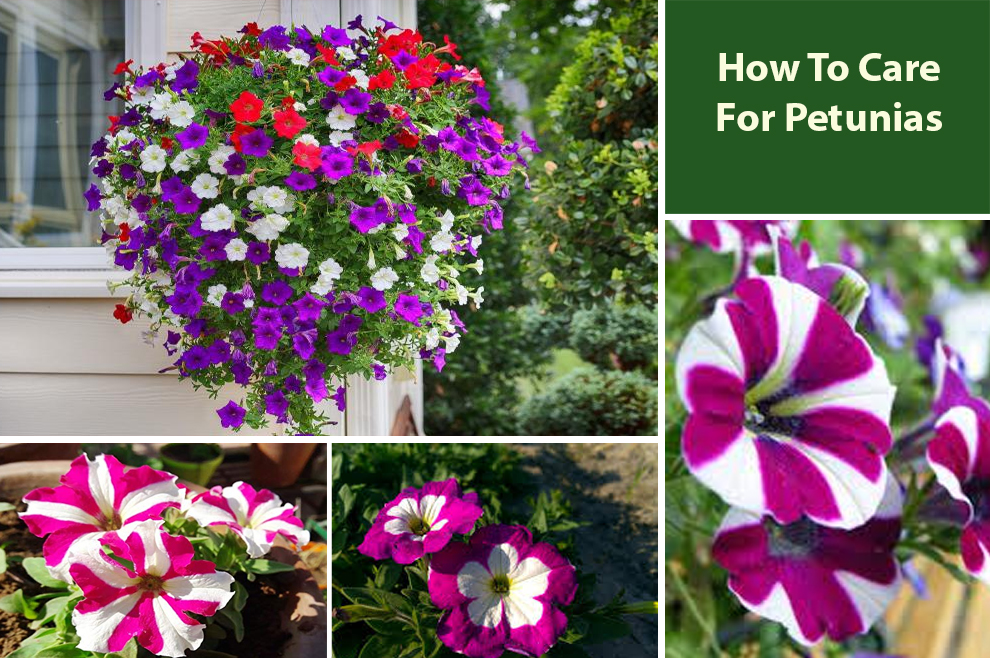
Petunias are a popular and beautiful flowering plant that can add color and vibrancy to any garden or landscape. They are relatively easy to care for and can be grown in a variety of settings, including flower beds, hanging baskets, and containers.
However, like all plants, petunias require some degree of care and attention to produce abundant blooms. Petunias prefer sunny locations rather than shaded ones, but intense sunlight and heat during the summer season may cause a temporary halt in blooming.
If you are not aware of how to care for petunias, don’t worry, it is no rocket science.
All you need to know is that apart from a sunny location, petunias require regular watering and fertilization throughout the growth period, from spring to fall.
Providing some shelter from harsh weather conditions may also be necessary, such as moving potted petunias to a covered indoor spot or setting up a temporary cover over the flower beds.
In this guide, we’ll cover the basic care guidelines for petunias, Petunia winter care, and caring for hanging petunia pots or containers. This all includes information on their preferred growing conditions, watering needs, fertilization, pruning, pest management, and.
Whether you’re a seasoned gardener or just starting, this guide will help you keep your petunias healthy and beautiful all season long.
Petunia Plant Care: Key Points
| Petunia other names | Petuny, Petunya, Floribunda, Grandiflora, Multiflora, Milliflora, Wave petunia, Surfinia, Calibrachoa |
| Sunlight | Six hours of direct sunlight per day |
| Soil pH and type | Well-draining loamy soil with 6.0 and 7.5 pH |
| Temperature | Between 60 – 80°F during daytime, 60-70°F at night |
| Humidity | 40 to 60% humidity levels |
| Watering | Water deeply once or twice a week |
| Fertilizers | Balanced fertilizer with equal or near-equal amounts of nitrogen, phosphorus, and potassium |
| Pruning | Regular pruning required |
How To Take Care Of Petunias?
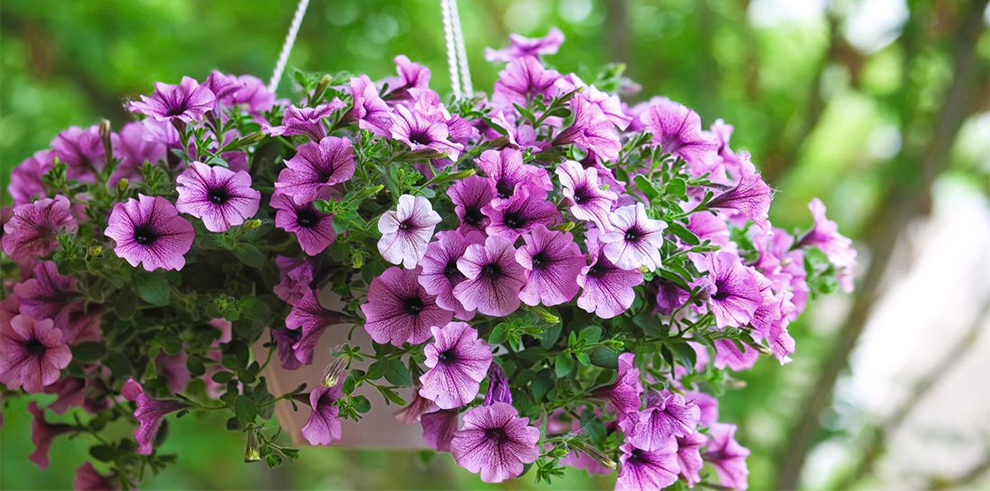
Petunias are beautiful, low-maintenance flowers that are popular in gardens, hanging baskets, and containers. Here are some tips for taking care of petunias:
A. How often do you water petunias?
Petunias require regular watering, particularly during dry spells. It’s important to keep the soil evenly moist but not waterlogged, as this can lead to root rot. Water them deeply once or twice a week, depending on the weather and the type of soil.
B. Do petunias like sun or shade?
Petunia varieties require plenty of light to grow and bloom well. They thrive in full sun, which means at least six hours of direct sunlight per day. However, they can also tolerate partial shade, which is defined as three to six hours of direct sunlight per day.
If you live in a hot climate, petunia plant care includes providing some afternoon shade to prevent the plants from overheating.
If you’re growing petunias indoors, place them near a sunny window or provide supplemental light with artificial grow lights. Keep in mind that insufficient light can result in leggy, weak plants that produce fewer flowers.
C. What kind of soil do petunias like?
Petunias prefer well-draining soil that is rich in organic matter. The ideal soil pH for petunias is between 6.0 and 7.5. To prepare the soil for planting petunias, mix in some compost or aged manure to improve the soil’s fertility and water-holding capacity.
If you’re planting petunias in containers, use a high-quality potting mix that is specifically formulated for container gardening. For proper petunia flower care, you should avoid heavy or clay soils, which can retain too much moisture and cause root rot.
Additionally, make sure the soil is free of rocks, sticks, and other debris that can hinder drainage and root growth.
D. Can petunias survive 100° weather?
Petunias grow best in temperatures between 60 and 80°Fahrenheit. They can tolerate some temperature fluctuations but not extreme heat or cold.
This can stress the plant and impact the growth of petunias and blooming.
Petunia varieties prefer moderate humidity levels around 40 to 60%. In areas with high humidity, be careful not to overwater the plants, as this can lead to fungal diseases.
Good air circulation around the plants can also help prevent humidity-related issues.
E. Should you fertilize petunias?
Petunias benefit from regular fertilization to encourage healthy growth and abundant blooms. While petunias can survive without fertilization, they may not thrive or produce as many flowers.
Fertilization provides essential nutrients like nitrogen, phosphorus, and potassium that are necessary for petunias to develop strong roots, stems, and foliage, as well as vibrant flowers.
Without sufficient nutrients, petunias may become leggy, pale, or fail to bloom altogether.
F. Is it necessary to deadhead petunias?
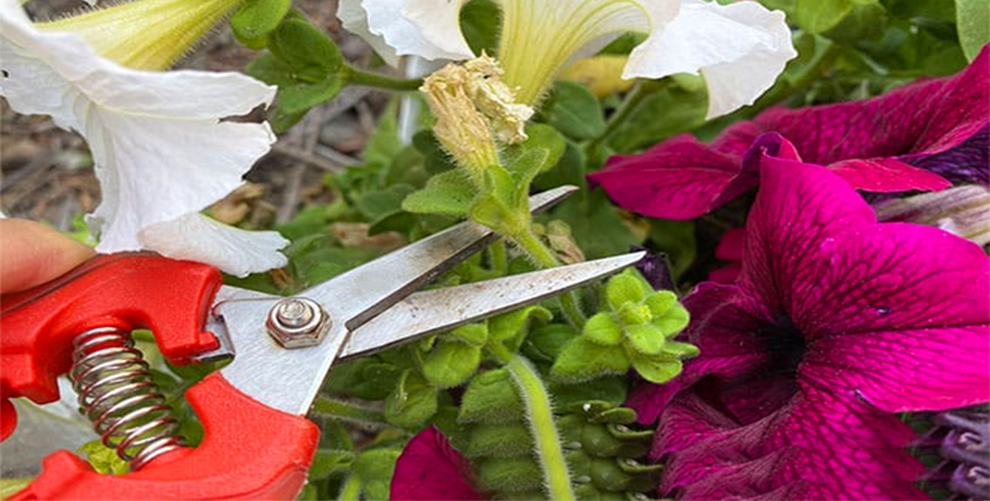
The Petunia care guide includes deadheading as it encourages more blooms and maintains a neat appearance. When you deadhead petunias, you remove the fading or dead flowers along with the developing seed heads.
This signals the plant to produce more flowers instead of focusing its energy on seed production.
Deadheading also helps prevent the plants from becoming leggy or sprawling, as it promotes compact growth. To deadhead petunias, simply pinch off the spent flowers just below the base of the flower head using your fingers or a pair of scissors.
Do this regularly throughout the growing season, and you should see more blooms and healthier-looking plants.
G. When should I repot petunias?
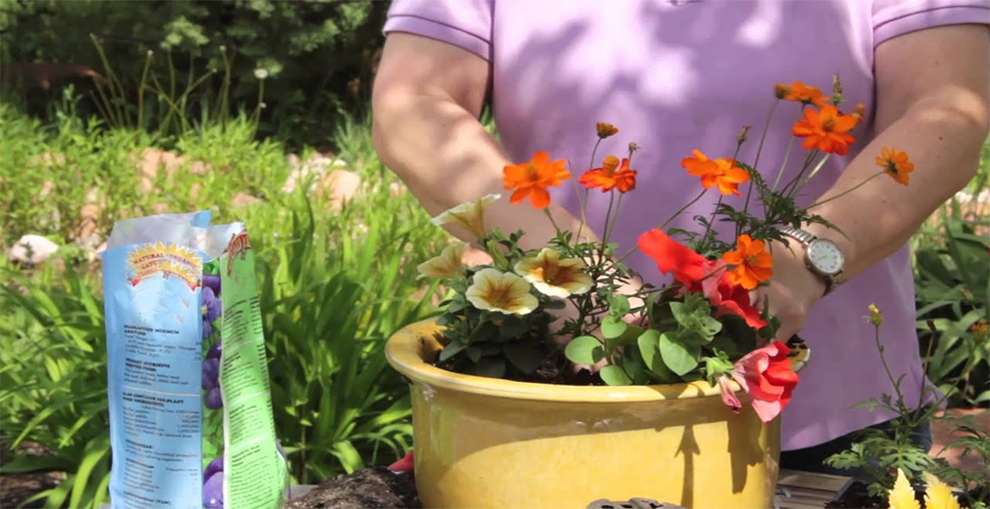
Repotting petunias is not always necessary, but it can be beneficial for the plant’s health and growth. As petunias grow and develop, their roots can become cramped and overcrowded.
This leads to poor growth and a reduced ability to absorb nutrients and water. This ultimately results in shortened petunia lifespan.
Repotting petunias into a larger container can provide more space for the roots to grow and expand, which can result in healthier and more vigorous plants.
Additionally, repotting allows you to refresh the soil, which can become depleted over time, and add nutrients to promote growth and blooming.
However, if your petunias are growing well and you are satisfied with their size and appearance, repotting may not be necessary.
Overall, petunia plant care is fairly easy and can bring a lot of color and beauty to your garden or home. With a little attention and care, your petunias should thrive!
What Pests and Diseases Can Petunia Get?
| Pest & Diseases | Symptoms | Treatment |
| Aphids | Wilting and yellowing | Spray the plants with a strong stream of water or use insecticidal soap or neem oil |
| Spider mites | Yellowing, wilting, and a fine webbing on the leaves | Spray the plants with water, apply insecticidal soap or neem oil, or use predatory mites |
| Whiteflies | Yellowing, wilting, and stunted growth | Use yellow sticky traps or apply insecticidal soap or neem oil |
| Powdery mildew | A white or gray powdery coating on the leaves and stems, causing them to become distorted and eventually die | Remove affected leaves, increase air circulation, and apply fungicides |
| Botrytis blight | Wilting, brown spots, and a fuzzy gray or brown mold on the leaves and flowers | Remove affected plant parts, improve air circulation, and apply fungicides |
| Root rot | Root damage and decay | Ensure the soil is well-draining and avoid overwatering the plants |
How To Care For Petunias In Hanging Baskets?
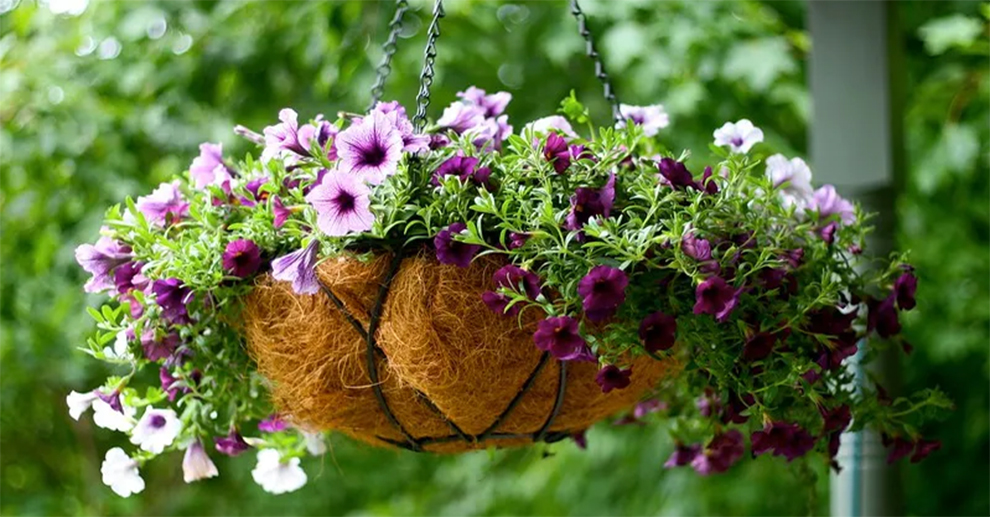
Hanging baskets require more frequent care than plants in the ground due to the faster leaching of water and nutrients.
Caring for petunias in hanging baskets is relatively simple if you follow these basic steps:
1. Watering: Petunias require regular watering to thrive, especially when they are in hanging baskets. Water the petunias deeply, so that the soil is thoroughly moistened, but avoid over-watering, as this can cause root rot.
Check the soil moisture level regularly and water when the top inch of the soil feels dry to the touch.
2. Fertilizing
Petunias are heavy feeders and require regular fertilization to produce prolific blooms. Petunia flower care includes using a balanced fertilizer (10-10-10) every two to three weeks during the growing season, following the manufacturer’s instructions.
3. Deadheading: To encourage continuous blooming, remove spent blooms regularly by pinching them off with your fingers or using scissors. This will also help to prevent the plant from becoming leggy.
4. Pruning: To keep the petunias looking tidy and prevent them from becoming too long and spindly, pinch back the tips of the stems regularly. This will encourage the plant to produce more branches and blooms.
5. Pest and disease control: Keep an eye out for pests such as aphids and spider mites and treat them promptly with insecticidal soap or neem oil. Also, be vigilant for signs of fungal diseases such as powdery mildew and treat them promptly with a fungicide.
By following these simple steps, you can craft your stunning petunia hanging baskets.
How To Care For Petunias In Pots?
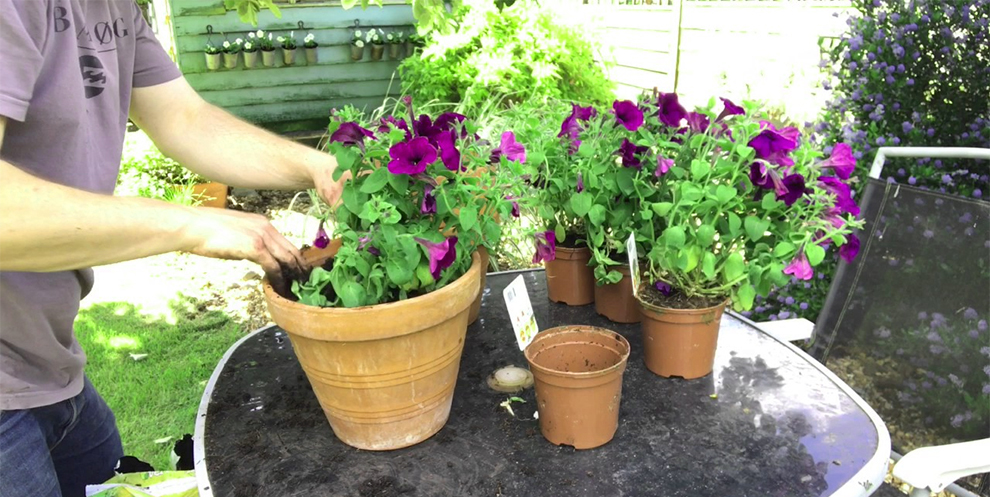
Caring for petunias in pots is similar to caring for petunias in hanging baskets. Here are some tips:
1. Pot size and soil: Choose a pot that is at least 6-8 inches deep with good drainage holes and fill it with high-quality potting soil. Make sure the pot is large enough to accommodate the root system of the petunia plant.
2. Watering: To ensure proper hydration, water the petunias deeply enough to thoroughly saturate the soil, but be careful not to overwater. Regularly check the soil moisture level and water only when the top inch of soil feels dry to the touch.
3. Fertilizing: For petunia flower care in pots, it is essential to fertilize them regularly. Apply a balanced fertilizer (10-10-10) every two to three weeks during the growing season, and follow the manufacturer’s instructions carefully.
4. Deadheading: Promote continuous blooming by regularly removing spent blooms either by using scissors or pinching them off with your fingers. This method also prevents the plant from becoming leggy.
5. Pruning: Regularly pinch the tips of the stems to maintain a neat appearance of the petunias and prevent them from becoming elongated and spindly. This practice promotes the growth of more branches and blooms.
6. Pest and disease control
Be vigilant for pests, including aphids and spider mites, and immediately treat them with insecticidal soap or neem oil. Additionally, keep an eye out for symptoms of fungal diseases like powdery mildew, and promptly treat them with a fungicide.
With proper care, you can enjoy beautiful, healthy petunias in pots all season long.
Petunia Winter Care
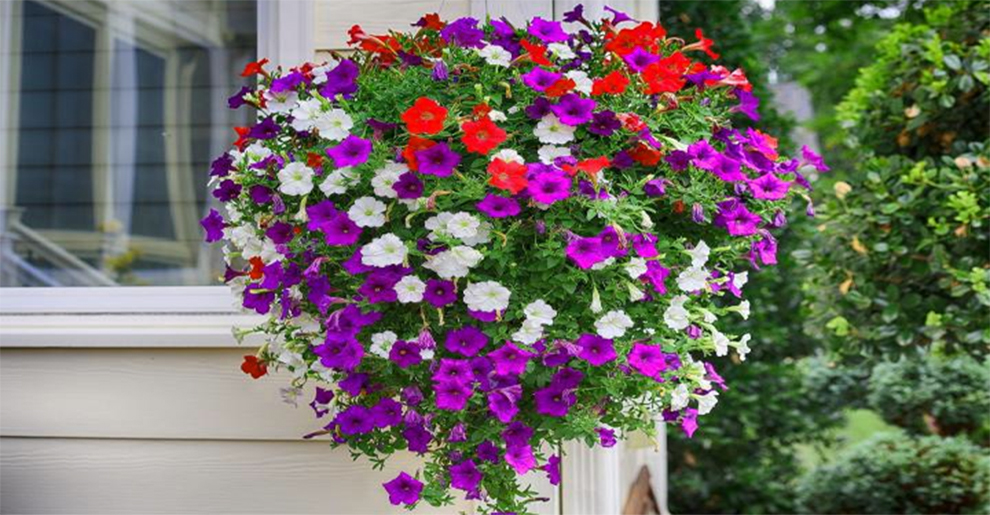
Petunias are annual plants that do not tolerate frost or freezing temperatures, and they typically die off during the winter season. However, there are a few steps you can take to care for petunias during the winter months:
1. Move indoors: If you live in a region with harsh winter conditions, consider moving your petunias indoors. You can keep them in a cool, bright room or a greenhouse. Place them near a window that gets at least six hours of sunlight each day.
2. Prune back: If you choose to keep your petunias outdoors, prune them back to about half their size in the fall before the first frost. This will help the plant conserve energy during the dormant winter months.
3. Mulch
If you decide to leave your petunias outside, cover the soil with a thick layer of mulch. This will help to protect the plant’s roots from cold temperatures.
4. Water sparingly: During the winter months, petunias do not require as much water as they do during the growing season. Water them sparingly to avoid overwatering, which can cause root rot.
5. Monitor for pests: Even during the winter months, it’s essential to keep an eye out for pests such as spider mites and aphids. Treat them promptly to prevent damage to your plant.
Following our petunia care guide will ensure that your petunias survive the winter season.
